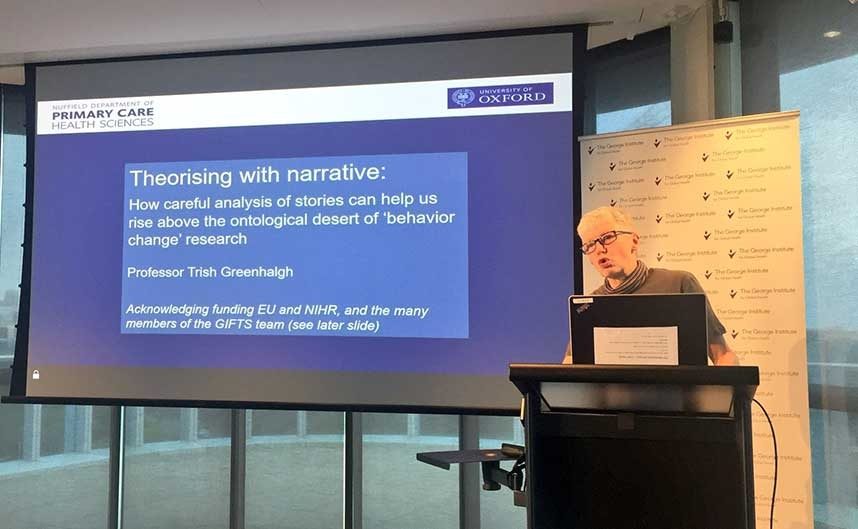
Collecting stories: Narrative research to capture health cultural contexts

Professor Trish Greenhalgh, Distinguished Fellow at The George Institute for Global Health and Professor of Primary Care Health Sciences at Nuffield Department of Primary Care Health Sciences at the University of Oxford delivered a public lecture at The George Institute on 'Collecting stories: Narrative research to capture the cultural contexts of health'.
This lecture formed part of the launch of our new ‘think tank’ initiative. The George Institute think tank focuses on robust thought leadership around advancing ideas, perspectives, experiences and insights to improve health care delivery globally.
Part of the think tank initiative is a new Distinguished Fellows program that brings in outside expertise; people of excellence that can encourage, nurture and challenge what we are doing.
Professor Trish Greenhalgh is our first Distinguished Fellow at The George Institute for Global Health, and also Professor of Primary Care Health Sciences at Nuffield Department of Primary Care Health Sciences at the University of Oxford.
This lecture takes a starting point in the notion that ‘behaviours’ are actually ‘social practices’, profoundly shaped and constrained by cultural contexts.
Professor Trish Greenhalgh established the aim of narrative research is not necessarily to determine ‘the truth’ – universal, predictive – as much as to explore how individuals make sense of events; to explore attitudes and to explore meanings.
Using the example of diabetes in pregnancy and focusing on a British South Asian sample, Professor Greenhalgh illustrated how narrative research can go beyond the dry and under-theorised assumptions of behaviourism and illustrate the complex socio-cultural webs in which ‘lifestyle choices’ are suspended.
Professor Greenhalgh used examples of research into intergenerational cycle of deprivation and development of obesity-related problems in South Asian peoples, considering gestational diabetes, genetic programming and type 2 diabetes, to demonstrate the importance of understanding social and cultural contexts of behaviour. Women in the study were invited to join a story group or be interviewed individually, where they could communicate in their preferred language and share their pregnancy experience. Researchers used a conversational approach, using narrative prompts guided by their own curiosity.
Narrative data was collected and analysed in phases including immersion, description, theorisation, illustration and validation, to create a ‘critical fiction’ that could be taken back to women in the study to check if the interpretations were correct.
Discoveries included commonalities such as the experience of pregnancy with diabetes being a stressful state, the impact of behaviour on symptoms such as exercising making people feel ill, and the weight of importance placed on peer and family advice as opposed to directions from doctors.
Also discovered was the stories about family, community and past health encounters that influenced perspective and behaviours.
Importantly, this presentation demonstrated that narrative analysis is not merely a search for ‘themes’ but an exploration of the narrative form. It identified the value of literary features such as the genre, characterisation, as well as the teller of the story, the performance, and the listener.
Such an analysis goes beyond a ‘barriers and facilitators’ taxonomy of findings and points to new opportunities for prevention and management of ‘lifestyle’ diseases.
The findings have important implications for ‘lifestyle’ disease prevention and management, and highlights that individual education should be supplemented with community-level interventions to address the socio-material constraints and cultural frames within which behavioural ‘choices’ are made.
About the speaker:
Trish Greenhalgh is an internationally recognised academic in primary health care and trained as a GP. She joined the Nuffield Department of Primary Care Health Sciences Medical Sciences Division at University of Oxford in January 2015 after previously holding professorships at University College London and Queen Mary University of London.
As co-Director of the Interdisciplinary Research In Health Sciences (IRIHS) unit, Trish leads a programme of research at the interface between social sciences and medicine, with strong emphasis on the organisation and delivery of health services. Her research seeks to celebrate and retain the traditional and humanistic aspects of medicine while also embracing the unparalleled opportunities of contemporary science and technology to improve health outcomes and relieve suffering.
Trish is joint module coordinator on the Knowledge Into Action (KIA) module of the MSc in Evidence Based Health Care.
Her past research has covered the evaluation and improvement of clinical services at the primary-secondary care interface, particularly the use of narrative methods to illuminate the illness experience in ‘hard to reach’ groups; the challenges of implementing evidence-based practice (including the study of knowledge translation and research impact); the adoption and use of new technologies (including electronic patient records and assisted living technologies) by both clinicians and patients; and the application of philosophy to clinical practice.
Trish is an active contributor to Twitter: @trishgreenhalgh


